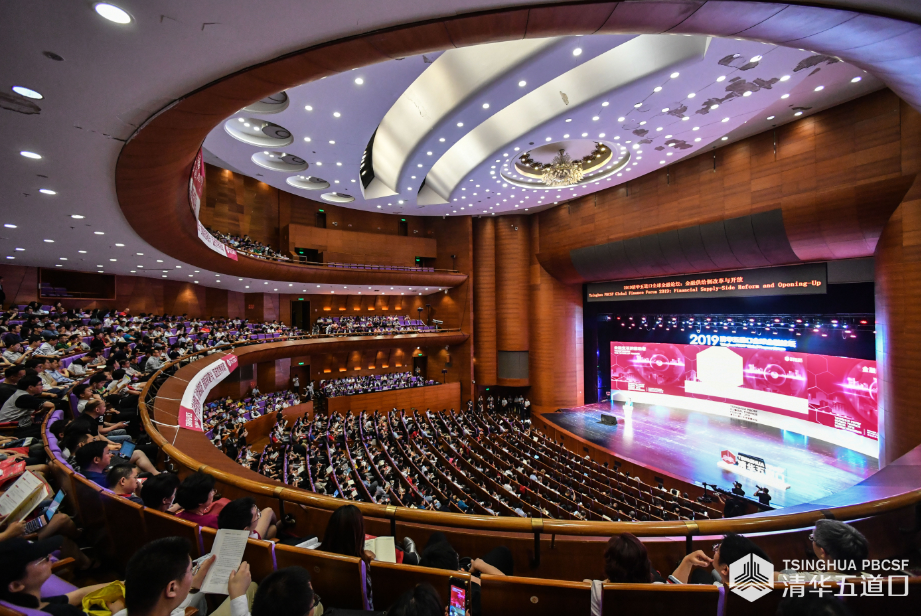Joined by governors and leaders from banking, finance, insurance, regulation and industry, the opening ceremony of the 2019 Tsinghua PBCSF Global Finance Forum kicked off on Saturday, May 25 at Tsinghua University, marking the fifth year of the forum. The two-day forum themes on Financial Supply-Side Reform and Opening-Up whereas the topic remains the centerpiece of China's economic agenda.

Liao Li, chair professor of finance and executive associate dean of PBCSF moderated the ceremony. Qiu Yong, president of Tsinghua University and Zhang Xiaohui, dean of PBCSF delivered the keynote speeches at beginning of the opening ceremony.
Qiu Yong underlined the fundamental role of finance sector and pointed out that finance is critical to Chinese economy, how to implement the new concept of development and how to deepen the supply-side structural reform are the key issues that finance sector has to tackle. Tsinghua attaches great importance to the development of finance discipline. With its traditional academic excellence and extensive connections with the industry, Tsinghua PBCSF will continue to strengthen its education and research, and proactively contribute to the reform of financial governance both in China and around the world.
Zhang Xiaohui, the dean of Tsinghua PBCSF pointed out in her speech that the supply-side structural reform is essential in the face of global uncertainties and complex domestic situation. To tackle the problems, the real economy needs the support from finance sector more than ever.She also emphasized the importance of finance and the exceptional talents are the main driving forces in the development of finance sector. PBCSF has always been making contributions with its cutting-edge research and its broad platform.
During the followed speeches, Xiao Yuanqi, the Chief Risk Officer on behalf of Guo Shuqing, the Chairman of China Banking and Insurance Regulatory Commission, Chen Yulu, the Deputy Governor of People's Bank of China, Yan Qingmin, Vice Chairman of China Securities Regulatory Commission, Zhu Min, former Deputy Managing Director of IMF and Hal S. Scott, Emeritus Nomura Professor of International Financial Systems at Harvard Law School shared their insights.One behalf of Guo Shuqing, Xiao Yuanqi said that the opening up of financial sector is a general trend. China welcomes foreign institutions with good market reputation and credit record to enrich the market and to stimulate market vitality. Foreign capital’s presence in China’s financial markets has remained relatively small, which only accounts for about 2% in China's A-share market.
Chen Yulu, the Deputy Governor of People's Bank of China laid out the role Chinese central bank is playing in setting monetary policies and in the process of supply-side reform. He said the central bank has been doing three main tasks recently, including promoting the healthy development of bond market, promoting market-oriented and legalized debt-to-equity swap and cooperating with the securities regulatory authorities to improve the system of the stock market to guide more medium-and long-term funds to participate.
Yan Qingmin, Vice Chairman of China Securities Regulatory Commission pointed out the ways to further promote the financial supply-side reform. He said optimizing the institutions in financial market is the key task in the reform. China should change the current financial structure and to inject more capital into the market. He also said that China should continue developing its capital market and build a standardized, transparent, open, dynamic and resilient capital market.
Zhu Min, former Deputy Managing Director of IMF stressed the importance of high-tech in the development of nation’s manufacturing sector. China’s economic status in the next five years will determine its road in the next five decades. He showed the use of AI in industrial value chain and pointed out that since China’s income convergence is at the cross road, high technology including AI will give a leg to the country’s development.
Professor Hal S. Scott from Harvard Law School talked about issues that related to the systematic risks. He said the way to avoid the risks is to inject adequate capital and balance the capital and liquidity. He suggested the country to balance the regulation and the growth and also focus on the tools that people can use after the crisis which is also important as the prevention measures.
The Forum is hosted by Tsinghua University, organized by Tsinghua PBCSF, and co-organized by the National Institute of Financial Research and the Institute for Fintech Research, Tsinghua University. The previous Forums were successfully held in 2014, 2015, 2017 and 2018, attracting thousands of renowned policy-makers, corporate executives and scholars to participate in discussions and exchange insights on the opportunities and challenges the industry is facing, arousing substantial attention from the financial services sector, academia and media.